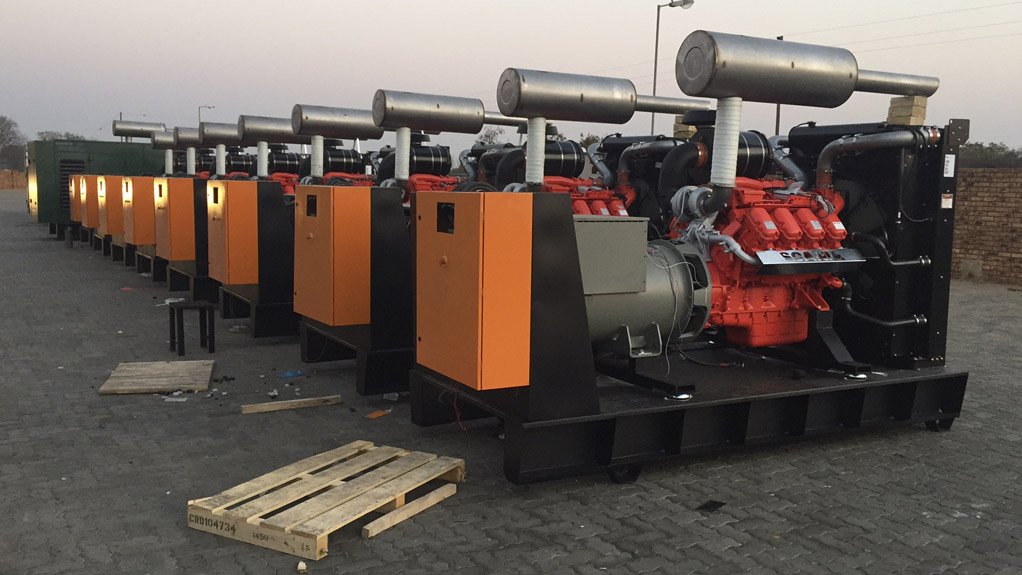The parallel synchronisation of smaller generators to achieve the same power outputs as a single large generator offers significant cost-saving benefits to South African businesses that must manage continued grid power supply uncertainties, says generator manufacturer Maverick Generators MD Gerardo Cammarata.
He notes that concerns in South Africa’s power industry have shifted from a shortage of power generating capacity to issues concerning distribution infrastructure. This includes issues such as poor maintenance of ageing substations, unstable transformers, cable theft and overloading on the national power grid continuing to make power failures a daily reality for some parts of the country.
Cammarata highlights that from 2007 to 2008, and again from 2014 to 2015, the country suffered a debilitating shortfall in power generation capacity, owing to consumer demand significantly outstripping the generation capacity of State-owned power utility Eskom. This, however, has since been addressed, says Cammarata, mentioning that units at Medupi power station, in Limpopo, have come on line and maintenance on power generation infrastructure has been updated. He adds that, with a considerable slowdown in the global economy over the past year, the demand from local consumers has also fallen drastically.
“The main problem now facing consumers in South Africa is an inefficient power distribution network. “Local municipal infrastructure needs to be maintained and upgraded, especially as there are neighbouring African countries that are also relying on electricity imports from South Africa. Unfortunately, I do not believe that we will see the end of electricity outages in South Africa, and the subregion as a whole, for a while yet.”
Many companies have conceded the need for their own backup power sources in order to manage power unreliability in their operations. Cammarata points out that, while globally there has been a shift towards producing electricity using gas-powered engines as an alternative source of energy, in South Africa, gas resources are limited and traditional generators are the standard solution for most companies in the country.
However, he highlights that it is significantly more cost-effective to build several 500 or 600 kVA generators that can run simultaneously, than to build a single larger unit. He further points out that fuel consumption is much lower in smaller units than in a larger one, as synchronised systems allow generators to be independently brought on line or shut down as the load demand increases or decreases.
“Unlike a single generator that will run with a standard output no matter what the load profile is, with two or more smaller units the system’s output can be tailored to the demand. “This not only saves fuel but also reduces wear and tear on units.”
Synchronised systems also allow the generators to run parallel to the user’s utility supply, with the generators able to start automatically to supplement utility supply when it is insufficient to supply the load demand. The system can alternatively be programmed to start up prior to planned utility shutdowns and to synchronise its output to the utility’s in order to ensure an uninterrupted supply of power.
“While a breakdown of a single generator could, moreover, spell disaster for a business, if one generator in a parallel plant breaks down, the other units can continue to operate, albeit at a lower capacity.”
Maverick has configured several parallel generator plants for a range of different industries with great success. These include a seven-unit plant for mining and industrial equipment supplier Hitachi SA at the Medupi power station, a five-unit plant for agricultural company Grainfield Chickens and a two-unit plant for Reiz Water Treatment Facility in the Free State, and a two-unit plant for food and drink company Nestlé in Gauteng.
In September last year, the company also completed their largest order to date of an eight-unit 500 kVA-unit plant for a soya bean processing plant in Mokopane, in Limpopo.
Edited by: Zandile Mavuso
Creamer Media Senior Deputy Editor: Features
EMAIL THIS ARTICLE SAVE THIS ARTICLE
To subscribe email subscriptions@creamermedia.co.za or click here
To advertise email advertising@creamermedia.co.za or click here













